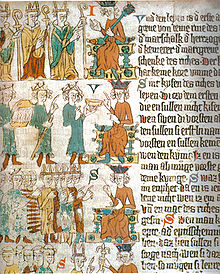
Back Keurvors Afrikaans Kurfürst ALS أمير ناخب Arabic امير ناخب ARZ Kürfürst Azerbaijani Курфюрст Byelorussian Курфюрст Bulgarian Priñs-dilenner Breton Príncep elector Catalan Kurfiřt Czech

Left to right: Archbishop of Cologne, Archbishop of Mainz, Archbishop of Trier, Count Palatine, Duke of Saxony, Margrave of Brandenburg and King of Bohemia (Codex Balduini Trevirorum, c. 1340)

| Part of a series on |
| Imperial, royal, noble, gentry and chivalric ranks in Europe |
|---|
 |
The prince-electors (German: Kurfürst (), pl. Kurfürsten, Czech: Kurfiřt, Latin: Princeps Elector) were the members of the electoral college that elected the ruler of the Holy Roman Empire.
From the 13th century onwards, a small group of prince-electors gained the privilege of electing the King of the Romans. The king would then later be crowned Emperor by the pope. Charles V (elected in 1519) was the last emperor to be crowned (1530); his successors assumed the title "Elected Emperor of the Romans" (German: erwählter Römischer Kaiser; Latin: electus Romanorum imperator) upon their coronation as kings.
The dignity of elector carried great prestige and was considered to be behind only the emperor, kings, and the highest dukes.[1] The electors held exclusive privileges that were not shared with other princes of the Empire, and they continued to hold their original titles alongside that of elector.
The heir apparent to a secular prince-elector was known as an electoral prince (German: Kurprinz).
- ^ "Precedence among Nations". www.heraldica.org. Retrieved 2020-04-26.